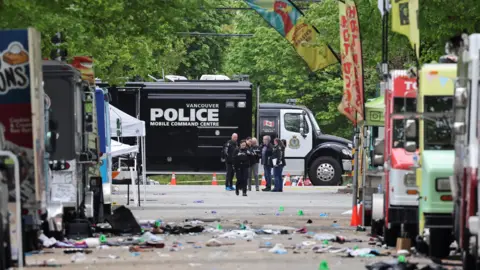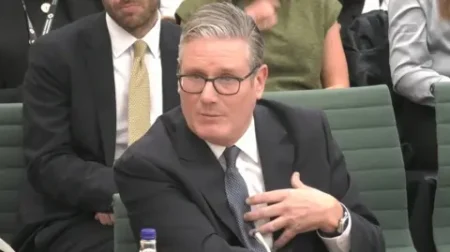A tragic incident unfolded in Vancouver, Canada, where a car was deliberately driven into a crowd during the annual Lapu Lapu Day street festival, a celebration of Filipino culture. This horrific attack resulted in the deaths of eleven individuals, and the perpetrator, identified as 30-year-old Kai-Ji Adam Lo, has been charged with eight counts of second-degree murder. The police have indicated that further charges are probable, as their investigation is ongoing, particularly involving the identification of victims, which continues to be a sensitive and challenging process.
Responsibility for this devastating event was swiftly taken by Lo, who was detained at the scene by bystanders before being arrested by law enforcement officers. Investigators have reported that Lo had a history of interactions with police due to mental health issues, leading them to rule out any extremist motives for the attack. Instead, they are currently focused on understanding the psychological state and background of the suspect prior to the incident. This aspect underscores the complexity of the case, illustrating how mental health challenges can lead to catastrophic outcomes when left unaddressed.
Victim profiles revealed a wide range in ages, from young children to seniors, highlighting the indiscriminate nature of the tragedy during what was intended to be a joyful occasion. According to local community leaders and eyewitness accounts, the festival was bustling with families and friends enjoying the festivities. One community member, Abigail Andiso, vividly recounted the chaos that ensued as the vehicle barreled through the crowds, leaving many injured and panic-stricken.
The grief within the Filipino community of Vancouver is profound, with leaders expressing how the impact of this attack will reverberate for years to come. RJ Aquino, a representative of the Filipino community in British Columbia, conveyed the sentiment of collective mourning, stating that the community is grappling with questions and a deep sense of loss. Personal stories from festival attendees reveal not only a loss of life but a palpable destruction of the sense of safety and joy that community gatherings typically foster.
Community members began gathering at the site on Sunday to pay their respects, laying flowers and mourning the loss of their loved ones. This solidarity in grief manifests the strong ties within the Filipino community, which numbers over 140,000 in Vancouver alone, illustrating their shared heritage and cultural pride. Statements from community organizers highlighted the anguish of having such senseless violence disrupt a celebration meant to honor a historical figure—Lapu-Lapu, a national hero known for resisting Spanish colonization in the 1500s.
The tragic timing of the attack has also affected broader societal contexts, including the political landscape. As Canada approaches its federal elections, Prime Minister Mark Carney expressed his heartbreak over the attack, demonstrating the event’s significant impact on national sentiment. He and other political leaders attended memorials, showcasing the community’s resilience and unity in the face of violence.
The police chief, Steve Rai, characterized this day as “the darkest day” in Vancouver’s history, reflecting the emotional weight this incident has placed on the city. He highlighted that many victims were seriously injured and that the death toll might rise as investigations continue. Rai, drawing attention to the safety protocols implemented for the festival, indicated that there were indeed measures in place, although they proved inadequate given the nature of the attack.
As the community navigates this devastating incident, discussions surrounding mental health and public safety protocols have gained urgency. The city’s officials and first responders are anticipating a reevaluation of their strategies in light of this tragic event, trying to ensure that future community celebrations can be conducted safely. Just as this festival aimed to celebrate culture and community, the aftermath of its violence serves as a solemn reminder of the fragility of public safety amid gatherings intended for joy and unity.











